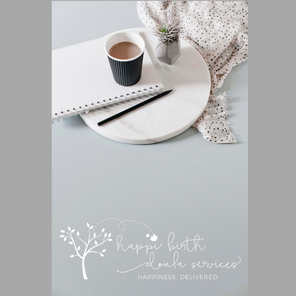 As a Doula, I provide two prenatal visits for couples throughout the last few months of pregnancy. One visit is to plan the birth and the second is used to discuss all things postpartum once baby arrives. I believe both topics are of great and equal importance in preparing for the two major life events they are about to experience. I spend a good hour or two at each visit helping couples navigate the many decisions and options available to them. If you are expecting, I would strongly encourage you to learn as much as you can about the birth process through childbirth education classes. You cannot formulate a birth plan if you do not understand what your options are. You also need to ask a lot of questions when you tour your place of birth. Here are just a few things you'll need to inquire about in order to create your birth plan. This list is limited but gives you an idea:
Having said that, we know not everything always goes according to plan, but having it in writing absolutely gives the provider and nurses a very solid idea of what you do and don't want. Things like, "Please do not ask me if I want pain medication" take the guesswork out of a situation where mom may be struggling through labor. The nurses know she will ask for help when or if she reaches that point. ~Happi Note: I provide birth planning sessions and private, in-home childbirth education classes. Contact me if you are interested in learning more about your options. This can be a scary time full of many unknowns. I'm glad to answer all of your questions! What should you pack in your hospital bag? Here's a checklist to get your started!
For Mom:
Anything else you'd add? Leave it in the comments below!  The driving force behind my choosing doula work as a profession was my own personal experience. As I have processed the births of my three children, which have all been totally different and unique, I recognize now, more than ever, how important it is for a woman to feel positively about her birth. While I cannot promise specific outcomes for birth clients, I can definitely help set them up for success to the best of my ability with the knowledge and skill set I have. If you are pregnant and have specific goals and objectives that you'd like to accomplish in your birth, I believe there are 5 important things that you may want to consider as you plan for your birth experience. I truly believe that doing these things will make the biggest impact on your birth outcome. 1. Carefully choose your provider. It is incredibly important that the provider you choose has respect and understanding for the way you want to birth and is supportive of the various aspects of your birth plan (assuming you have a general understanding of what you want it to look like). Take time to research different obstetricians and midwives early in your pregnancy, ask friends who they have used and why, and ask any birth workers you may know already (such as doulas, childbirth educators, labor and delivery nurses etc.) what to look for based upon your wishes for your birth. If you do not feel that your current provider is supportive of the way in which you want to birth, it is okay to consider switching providers, assuming there is enough time left in your pregnancy to be accepted by the practice. Ideally, it is best to have done your research early in your pregnancy so that you aren't scrambling at the last minute because you are feeling that your current provider isn't a good fit for you. 2. Hire a doula. One of the most important things you can do to accomplish your goals for your birth is to hire a labor doula. Over and over again, women who have had a positive birth experience share that it was in part because they had a doula. It's not that we, as doulas, can guarantee specific outcomes because every birth is different and unique. What we can do, however, is guarantee that you have amazing, consistent support. I personally work very hard to contribute value as part of the birthing woman's team, serving her alongside her partner, provider, nurses, and anyone else she may choose to have with her. A good doula knows how to support her client through emotional support (labor is hard work, so compassion and encouragement through the process is key!), informational support (help being able to understand and dissect information as it's given to you), and physical support (hands-on comfort measures, positional changes, utilizing birth tools available, etc). 3. Educate yourself! The saying, "knowledge is power" has great application when it comes to birth. The more you know, the better prepared you are. Truly, nothing can prepare you for the experience that is birth. It is like nothing else you have been through, and probably like nothing else that you will go through in the future. The beautiful thing about birth is that the discomfort you feel has purpose. It is a necessary means to an end...the moment you finally get to hold your baby in your arms! Often, however, women in our culture fear birth because they don't know how or if they will be able to manage the pain. It may be that they had a prior traumatic birth experience, or perhaps someone close to them did and they are scared the same might happen to them. There can be many reasons they are fearful. Because of this, I encourage clients to arm themselves with information, and I often recommend great books to my clients that will encourage them in their journey of labor. Not only do they help educate but they also encourage and inspire. "Your body was made to do this," I often tell clients. "Trust it. It knows what to do." As you read, learn, and arm yourself with knowledge, you'll find that these words are true! 4. Take Childbirth Education Classes. This falls under the above category of educating yourself, as nothing can prepare you fully for the birth experience. It really needs its own category, though, because the classes you take should fall in line with your goals for your birth. Childbirth education classes can be very helpful for understanding the process of labor and birth and should present you with specific options to consider as you formulate your birth plan. There are so many choices out there for your consideration. I encourage you to again do your research and then pick the one that seems to be the best match for you and your goals for your birth (as well one that will best serve your partner!). 5. Formulate a birth plan. Creating a birth plan is something I do with my clients as part of my service to them, but if a doula isn't an option for you, then there are several great websites and templates you can utilize. Your birth plan should be very specific. It should be kept concise and limited to one page, as nurses and doctors don't have time to read pages and pages once you are admitted to your place of birth. Ideally, it is helpful if it can be presented to your provider at least one month before your estimated due date so that they can review it. In my experience, I have found that most doctors and nurses are very happy to see a birth plan and spend time going over it with you. I truly hope that these five suggestions are helpful to you as you plan for the birth of your baby. It is my desire that all women be armed with support, knowledge and information that results in a positive birth experience. Thanks for reading! Happi  When I started this blog, I wanted it to be, at times, a place for me to reflect upon my own insights and experiences that have had a hand in shaping me as a doula. This is one of those times. I am a Christian. My faith in Christ is the most important thing to me and it drives everything I do in my life. I am certain that God led me into this work as a doula for many reasons and I believe that His desire is that I would bring Him glory as I serve women in this very important time in their life. As a result, I felt compelled to share how and why my faith influences me as a doula. As a disclaimer, I want to say up front that I partner with couples and families of all faiths. In fact, one of the most important things to me is that my clients and their families know that I hold no judgment toward them for any of their choices, especially in birth. I support people right where they are, as they are, and I believe this is one of the most powerful and valuable things I give to them as their doula. Becoming a doula has been one of the best things to happen to me in my own spiritual journey as I have learned so much about myself and others. I will always be grateful for that! Here is why I believe there to be a very distinct connection between God and birth. First, I believe that God made the woman and baby fearfully and wonderfully. I believe that God is the Giver of life, and all aspects of life have been His idea from the beginning. As a doula, this means that I trust the pregnancy, labor, birth, and postpartum process implicitly. I believe that the pregnant woman's body was perfectly made to birth her baby. This doesn't mean that things sometimes can (and do) go differently than originally planned. But in most cases, I know that this is a perfect process that God has designed beautifully as mom and baby work together. As I support my clients, I know that I simply need to support the process and not interfere with it. Secondly, I believe that God instructs me to hold no judgment against others. As a doula, this means that supporting women in all birth choices is of utmost importance to me. I stated before that I support ALL women. So whether they birth at home in a tub or choose to get an epidural the moment they step into their hospital room, I am there, ready to support them in their choices. I treat the women in those two scenarios the same, because birth is a very vulnerable time for a woman, and she likely has very good reasons that brought her to those choices. It is simply my job to support her, without judgment, no matter what. Finally, I believe that pregnancy, birth, and babies are all miracles from God. Every aspect of the process - from conception, pregnancy, labor, and birth to mother-baby bonding and her ability to feed and nurture her child - are truly incredible. I am in awe of the way God designed mom and baby to work together so beautifully. It impacts me as a doula, because I have the knowledge of how the process works in order to support mom, but I also believe in the God and Giver of life that is guiding each of them. As I work with mom in pregnancy, for example, I can encourage her with such assurance that her body can be trusted to provide all it needs to for her baby. In labor and birth, I can remind her that every wave/surge/contraction is bringing her closer to meeting her baby for the first time, because I know that they are both working together, in sync with one another, just as God designed. As baby is born and mom holds him/her for the first time, I watch as the two of them are filled with God-given instinct. Baby rests quietly, and then soon begins looking for nourishment. Mom has already been producing what baby needs and is ready to provide it. Oxytocin overwhelms mom with love and a desire to nurture her baby and bonding continues. I can affirm her in those things and remind her that she is doing great and all is well. Should mom choose to breastfeed, her milk provides all baby needs, and mom and baby are off to a great start. It's all truly MIRACULOUS. This is why I do what I do. I believe in the process. I am passionate about helping moms achieve a positive birth experience because I know that it increases the likelihood that mom and baby transition easier into life together. Nursing goes better, postpartum depression rates are lower, and mom's satisfaction as she reflects back on her birth experience is more positive. Everyone wins. As a doula, I am committed to each of the couples I serve and I am truly humbled to be invited into that intimate time with them. I pray for each and every one of my clients throughout their pregnancies and labors, whether they are aware of it or not. It is my hope and prayer that each of them would walk away from their birth experience feeling loved and supported through the process. If they do, then I believe God has been honored as I serve them. The following is one of my favorite verses from the Bible, and it is such a beautiful promise to both mom and baby. I wanted to share it with you today: "For you formed my inward parts; you knitted me together in my mother's womb. I praise You, for I am fearfully and wonderfully made. Wonderful are your works; my soul knows it very well." ~Psalm 139:13-14 Thanks for reading! Happi  I love adding things to my Pinterest page. Have you followed me yet? (I have a whole section on Postpartum Survival. I hope you'll check it out!) I think it's so important to plan for what happens AFTER the birth just as it is to plan for the actual birth. I wanted to devote this post to a few of my favorite postpartum tips as you prepare to bring home baby (or if you're having a home birth, immediately following the birth!). These are absolute MUSTS for moms! First, PADSICLES. Ladies, you must have a few of these in your freezer and ready to go...then make sure your partner knows how to make them for those moments when you are yearning for some relief. They are amazing and will greatly aid in your comfort and healing. Next, SECURE HELP. Do not be afraid to take up your mother, mother-in-law, friend, sister, grandma, whoever, when they ask if they can help you. Say yes. Especially if you have other children. These wonderful helpers can prepare meals, clean, help with childcare, do laundry, bring you food and water, shop for you, etc. so that all you have to do is stay snuggled up in bed to bond with your new baby. There was a time when women were not expected to do anything or go anywhere for weeks after their babies were born. As a society we have gotten so far away from this important bonding period and resting time for mom. Remember you also have the option of hiring a local postpartum doula if you do not have support close by. Be prepared for the AFTERPAINS. If this is not your first baby, know that they will get worse with each subsequent baby. (Sorry to be the bearer of that news.) They should ease up after three days or so. These cramps are caused by your uterus contracting as it shrinks back to its pre-pregnancy size. They can be very uncomfortable, especially if you're breastfeeding. Ask your care provider what they recommend to minimize discomfort. Speaking of which, if you're planning on breastfeeding, have some support on hand BEFORE baby is born. This may mean connecting with a local La Leche League or Breastfeeding USA group. Know where the certified lactation consultants are in your area. Ask your hospital to recommend one, and note if they have any on staff. If you're in McHenry county in Illinois, I really like the West Dundee Facebook group. They are so helpful, quick to respond, and an awesome resource when you need some help and encouragement right away. Finally, REACH OUT for support if you are struggling as a new (or seasoned) mom. Postpartum depression is a real thing, and it requires immediate attention. Please, do not be afraid to admit that you are struggling. Remember, you are NOT alone. Reach out to a trusted family member or friend as well as to your provider. Let them know you are struggling so someone else is aware. The first days and weeks following baby's birth can be a very joyous time. But having a new baby to care for can also be very daunting and overwhelming. Having a few things covered before baby arrives can make a big difference in your postpartum recovery and transition into motherhood. Please always feel free to contact me for more information or resources! Thanks for reading! Happi  As I continue my series on birth and fear, it is my hope that these posts have been helpful to my readers. I have received some wonderful feedback, so thank you to those that are reading! Today I will address another one of the top 10 fears in childbirth: Interventions and complications. As I talk to pregnant women, I am very aware of the fact that there are different views of how women want to birth their babies. Statistics tell us that most birthing women choose to have an epidural and I want to be clear that I support women no matter how they choose to go about induction, pain relief, etc. Many women are completely fine with having interventions in their births and their outcome is still a joyful one. They aren't bothered in the same way that a woman desiring an intervention-free birth might be. I believe that birth choices are very personal and I hold no judgment toward those women who choose a medicated birth, desire to be induced for whatever reason, or even opt for an elective cesarean! To be clear, this post is not an advertisement for choosing intervention-free births, but rather a place for me to address this fear that I heard repeated often as I surveyed moms who are currently pregnant or who have recently had babies. This fear is common among first-time moms who are walking into the birth experience with a blank slate as well as seasoned moms who have had one or more intervention-free births or those who feel that their previous birth(s) was "less than ideal." For moms who sought to have as natural a birth as possible (meaning they desired to not have any medical interventions such as pitocin, an epidural, cesarean, etc.) but ended up with a birth that was filled with them, they may have ended up feeling less than satisfied with their birth experience, if not downright upset. In these cases, women need to be validated and heard. Having well-meaning people say things like, "Well, at least your baby is healthy....that's all that matters," is not always helpful. Birth choices are very personal, and these kind of comments can be hurtful to women who desired to have things go a certain way. They may feel like they failed, or that their body failed them. They may have significant feelings of loss. They may be at risk for postpartum depression or at the very least, have experienced a period of time that they had "baby blues." They may have had trouble bonding with their new baby and maybe even experienced resentment toward him/her. For these women, a repeat of this experience is a very real fear. For both groups, I want to offer what I hope will be helpful advice. First, I encourage you to have a birth plan. I have discussed that at length in a previous post in this series here. Make sure your support system and your care provider(s) know exactly what your wishes are. By being pro-active in this way, you are helping yourself and those around you know what you desire and what alternatives you prefer to pursue before you go the medical route. Second, educate yourself. Read, study, and ask questions of your providers and doula. Know the statistics of interventions, what causes them, and what you can do to prevent them as much as is in your control. Birth is extremely unpredictable, but there are quite a few things that we can control, so knowing what those things are and making sure your support system knows what they are is so incredibly helpful and important. Finally, if you haven't already done so, hire a doula. (I'll bet you didn't see that one coming, did you?) :) There is a great article here on the evidence of how having a doula resulted in more positive outcomes for women. Have a wonderful day! And as always... Thanks for reading! Happi  "Everyone Poops." That's the title of a book my sons always enjoyed reading when they were younger. It's also one of the greatest fears women have in childbirth. I often get asked the question, "What if I poop when I push?" Boys laugh at potty humor. In fact, in my house, that conversation is pretty commonplace. But women tend to be more...discreet. If you deliver in a hospital, you may already be anxious about the point at which all modesty goes out the window when you're on the table with bright lights and doctors, nurses, doulas, and the like in your private space. Add in the possibility of having a bowel movement during all of that flurry of activity and that may be enough to make you want to run for the hills and just not do this whole birth thing. Trust me when I say that one of the things that all professionals in the field of labor and delivery wish women knew was that poop is really not a big deal. It happens. It's as normal and natural to them as sneezing and nose blowing is to us when we have a cold. And doctors are super quick about getting rid of it as if it never happened. They get it. And they aren't freaked out by it. Let me put it this way: If you poop when you push, it means you are doing it absolutely RIGHT. In fact, doctors and nurses will often remind women of imagery associated with having a bowel movement to describe HOW to push effectively when the time comes. So please, dear reader. Do not fear poop. Everyone does it. At least once a day. :) Thanks for reading! Happi  I have spent some time asking for feedback from moms about what their greatest fears were (or are) regarding childbirth. There are several that came up again and again, and today's post will address one of those as I continue this series on birth and fear. Fear Number 2 is this: "What if my wishes are not respected? What if no one listens to me and what I want for my birth and my baby?" Childbirth is deeply personal, and most women, as soon as they are aware that they are expecting, begin to feel very protective of that little person growing inside of them! After all, this baby is not only part of you, but you are feeling the weight and responsibility of taking care of yourself in a totally new way! This is the first step into motherhood: You are responsible for another human being! Here are a few ways to help you have some control over the birth process (because let's face it, birth is completely unpredictable!) and help make your wishes known and heard. Have a birth plan. Let me first preface this point by saying that there is no way to completely plan for childbirth. If there's no necessary reason for a planned induction or cesarean section, then the expectant mom is watching the days tick by on the calendar wondering if today is the day her baby will arrive. This can be a grueling time as her body aches, she's hardly sleeping, she's filled with nesting urges (sometimes at the oddest times) and is feeling the need to get her bag packed (if she's having her baby in a hospital or birth center) and the nursery stocked. The good news is pregnancy lasts approximately nine months, so there's lots of time to plan and prepare! A birth plan is one thing a mom can do in advance that will help her feel more "in control" of what happens to her and her baby once the delivery is imminent. Birth plans are a great tool, and most doctors and nurses are respectful of them if they are kept "short and sweet." By that I mean that it's not always a great idea to walk into the hospital or birth center with three typed, single-spaced pages of details for them to try to follow. Many women don't always realize that doctors, midwives, and nurses are often tending to multiple patients on their shift, and so they really won't have time to read every detail. Here are a few pointers regarding the birth plan:
Stay flexible. As I stated before, there is absolutely nothing that is predictable about birth. So many things can and will happen that may alter your perfectly laid plans, and for those of us that have a hard time "letting go" this can be very difficult to handle. Let me share a personal story with you to underline this point. With the birth of my second child, I had a plan. Everyone knew my wishes, and I expected that it would pretty much be a repeat of my first-born's birth. It was the drug and intervention free birth that I had hoped for, and I assumed all would work out the same with my second. But as the birth progressed, it was becoming abundantly clear that my baby boy was not going to cooperate with that plan! After hours and hours of no progress and doing all I could naturally to bring on contractions (by now my water was already broken), it was clear that using pitocin to stimulate labor was necessary. The pitocin definitely brought on more consistent and strong contractions, however, my doctor soon realized that my baby was not in good position because of the immense pain in my lower back, nor was his head in optimal position to help further dilation (I was "stuck" at 4 centimeters dilated and he was apparently stuck too in poor position!). After a couple hours of pitocin, I was not progressing and was getting frustrated by the minute. The time came when the doctor knew that I was getting exhausted. I wasn't coping well. The baby started to show signs of distress. I was not tolerating things well. This whole progression of events was something I knew could happen but I was not prepared for it happening to me. At that point, I was at a fork in the road. The doctor suggested an epidural, in hopes that I could relax a little and rest, but even more, that my pelvis would relax and the baby could descend. I'm grateful to say that the epidural was effective. Had the final stages of birth gone any longer or gotten any harder, I would have likely ended up having a cesarean section (the doctor said I was moments away from needing one). It was not what I had planned. I had very mixed emotions about how things went with that birth and it took me a while to reach a place of acceptance for what it was instead of what I wanted. The point is this: I was so thankful I had a support system of people who took my hand and said, "We need to be flexible. What you are trying to do is not effective and we need to change course. You're not a failure. You're doing the best thing for you and your baby." As it turned out, an epidural was the best thing for me and my baby. And flexibility was key. Have support. You may notice a recurring theme here, and it's not just because I'm a doula. The fact is, birth outcomes are significantly better and more satisfying when you have a doula at your side. A doula, along with your partner, will know your wishes before the birth takes place and be able to support you every step of the way. She will assist you as you navigate the birth process and help you make informed decisions as things progress. She will encourage you and be your biggest supporter as she partners with your care providers to help you and your baby receive the best care possible. She will make sure you feel heard and respected, and will encourage you to find your voice when you may be afraid to speak up for yourself. I believe that if you are proactive and you've taken the time to formulate a birth plan, commit to being flexible through the labor and have an excellent support system in place, you can be confident that you will be heard and your wishes will be respected when the time of your little one's arrival is upon you. Thanks for reading! ~Happi |
AuthorHappi loves serving families in the Northwest Suburbs of Chicago as a labor doula and childbirth educator. When she's not at a birth, she loves spending time at home with her loving husband and homeschooling her sons. She also finds great joy in serving the Lord at her church and teaching children about the love of Jesus! Archives
July 2024
Categories
All
|



 RSS Feed
RSS Feed